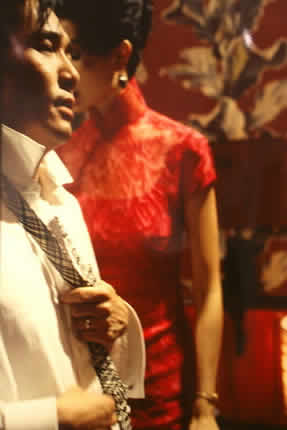It has been fifteen years since Hong-Kong director Wong Kar-Wai released his classic romantic drama Days of Being Wild. It was Wong’s second feature film effort, and although not a commercial success, it has been hailed as one of Hong Kong’s best films, and also as one of the best films of the 1990’s. The film was comprised of an all star cast that included the late Leslie Cheung (Farewell My Concubine, Happy Together), Tony Leung (In the Mood for Love, Happy Together), Maggie Cheung (In the Mood for Love, Clean), Andy Lau (Infernal Affairs, House of Flying Daggers), And Carina Lau (Flowers of Shanghai, 2046). The film is praised as one of Hong Kong’s first true art house features, and was the first installment of Wong Kar-Wai’s acclaimed “Trilogy” which includes the films In the Mood for Love and 2046. With the end of the year vastly approaching, I felt it necessary to analyze, critique, and bring this widely overlooked classic to the attention of a new generation of cinema fans.
and bring this widely overlooked classic to the attention of a new generation of cinema fans.
The film is an analysis on the complications of love, and the pain of rejection. Like most of Wong’s films, there is not a central plot or linear story line but rather the story’s progression is motivated by the characters actions in their seemingly banal day to day lives. The first character we are introduced to Yuddy (Cheung),a 1960’s an amorous playboy who treats women in the same manner that he lives his life, fast and carefree. His first victim is Li Zhen (M. Cheung) a young women who quickly falls for him, and is just as quickly thrown to the side. The film then cuts to Yuddy’s affair with Lulu (C. Lau) a vivacious and flaky cabaret dancer whose need for affection from Yuddy results in a constant barrage of mistreatment and heartbreak. During Yuddy’s fling with Lulu, Li Zhen returns into the picture. Distraught at Yuddy’s unwillingness to reciprocate her emotions, Li Zhen suffers an emotional breakdown, and is left to literally pain away outside of Yuddy’s apartment. While there, she meets Tide (A. Lau) a police officer who works the night shift. The two characters confide in one another and develop a platonic relationship. As the relationship progresses Tide’s affection for Li Zhen also grows but an intimate relationship never develops. By this time Lulu has been completely rejected by Yuddy and he himself has begun the process of self destruction. Yuddy’s best friend Zeb (J. Cheung) is brought into the picture and has a hidden love for Lulu. But due to her vain affections for Yuddy, he can never act on his feelings. It is later realized in the film that Yuddy’s frivolity and mistreatment of women stems from his own personal rejection, in the fact that he has never met his birth mother. The woman who raised Yuddy refuses to reveal the location of his mother because she feels that this will make her role in his life irrelevant lead to Yuddy’s abandonment.
With so many subplots, personalities, and emotions one would think that the film would be nothing less than a 2 plus hour, complicated feature. But at only an hour and a half and with very little dialogue, the film manages to thoroughly examine all of these characters and offer an important insight on love, rejection, and the overall human condition.
At first viewing one would instinctively point out Yuddy as the ill-natured antagonist, while the other characters in the film are the virtuous victims. But when analyzed closely one can see that all of the characters in the film are deeply flawed. The two female leads are young and naïve and not able to be see through Yuddy’s deception. They cling to a man who mistreats them and rejects them. Instead of accepting his true personality the women chase after him, and attempt to fight for his affection. The women’s lack of self confidence makes  them yearn for an individual that berates and mistreats them. This aspect of the film is a direct reference to the mindset of many young Chinese women of that time, and it is a mindset that still holds true today. The ideas of a lack of self worth and self pity are themes present throughout the film. Tide and Zeb’s unwillingness to act on their hidden love is another example of the motif of apprehensiveness. The film also suggests that the characters misfortunes are based on the circumstances and also on the actions of those around them. Even though the main theme of the film is rejection the characters are still connected and motivated by one another.
them yearn for an individual that berates and mistreats them. This aspect of the film is a direct reference to the mindset of many young Chinese women of that time, and it is a mindset that still holds true today. The ideas of a lack of self worth and self pity are themes present throughout the film. Tide and Zeb’s unwillingness to act on their hidden love is another example of the motif of apprehensiveness. The film also suggests that the characters misfortunes are based on the circumstances and also on the actions of those around them. Even though the main theme of the film is rejection the characters are still connected and motivated by one another.
The frivolity of the characters is reflected in the style and pace of the film itself. Scenes are very short and moths seem to pass in a matter of seconds. The characters move in and out of each others swiftly as do the scenes. There is a sense of interconnection of the all the characters, and by the climax, the film appears to come full circle.
When looking at this example it is obvious that this film is very reflexive of not only Chinese society but the human condition on a whole. Days of Being Wild is very subtle, simple, and deep film that will certainly strike a chord with anyone who considers them a fan of art house cinema.

